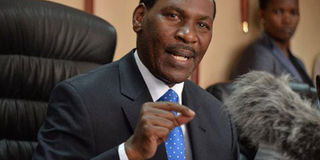Promoting film versus preserving Kenya’s morality: Ezekiel Mutua's dilemma

The Kenya Film Classification Board CEO Ezekiel Mutua. FILE PHOTO | NATION MEDIA GROUP
What you need to know:
- After its release in September 2018, KFCB banned Rafiki for ‘‘depicting homosexual scenes’’
- The film became the first from Kenya to be premiered at the Cannes Film Festival. The largest and most prestigious film festival in the world.
- Since his appointment in 2015, Ezekiel Mutua has walked the tightrope of promoting creativity while watching over the country’s morality.
- The KFCB CEO insists that the sensitive nature of his mandate is guided by established laws.
Last week, film director and producer Wanuri Kahiu announced to eager film enthusiasts across Africa that her short film Rafiki would be finally released on DSTV Box Office starting Monday this week.
Saying she was ‘‘incredibly excited’’ for the release and that the movie is Pan-African, Ms Kahiu put a caveat on her announcement: the Kenyan audience would not be watching Rafiki.
This was a somewhat veiled mockery on Kenyan authorities, particularly Kenya Film Classification Board, the state agency mandated to regulate film and broadcast content in Kenya. The board banned the movie in Kenya in 2018.
HARMLESS TALE
Rafiki, which features two young women lovers, best illustrates the ruthlessness of the film regulatory axe in Kenya.
After its release in September 2018, KFCB banned the film for ‘‘depicting homosexual scenes’’, even as Ms Kahiu described it as a ‘‘harmless tale from Africa’’.
KFCB CEO Dr Ezekiel Mutua vowed that Rafiki would not define the film industry in Kenya.
‘‘It contains homosexual scenes that are against the law, the culture and the moral values of the Kenyan people. The film seeks to overtly promote lesbianism,’’ he argued in a series of tweets.
“We will not allow the creation, distribution, broadcast, exhibition or possession of any film that offends the sensibilities of the Kenyan people,’’ he added.
GLOBAL RECOGNITION
Yet so popular was the film globally that it premiered at the Cannes Film Festival, the largest and most prestigious film festival in the world, during its 71st edition in May last year. It was the first Kenyan film to achieve this feat.
KFCB accused the producers of Rafiki for ‘‘altering the script’’ significantly to obtain a license to film adding that it was criminal to do so. The regulator even threatened to sue the producers for breach of filming procedures.
“I was upset and disappointed, largely because I think Rafiki is a local story that was told here and should be seen here,’’ Kahiu told the Nation at the time.
‘‘If other countries on the continent feel it’s okay to see the story, why not in Kenya?” she posed.
Dr Mutua however saw the matter through a different prism.
KENYAN VALUES
“The more you bombard people with a certain narrative, the more they become sympathetic towards that way of life,’’ he argued.
‘‘We are aware that some of our brothers and sisters are homosexuals, but we also acknowledge that this is not our way of life,” he added, in reference to homosexuality.
With an annual budget of Sh600 million, KFCB classifies film content against the parameters of nudity, obscenity, foul language, incitement, propaganda for war, occultisms and horror and gory images. Works are assessed based on the frequency and intensity of these elements.
The philosophy behind this government function, Dr Mutua argues, is to ensure that film content conforms to Kenya’s cultural values and national aspirations and to protect children’s premature exposure to adult content.
Classification occurs at the creation, distribution, broadcasting and exhibition stages of all film content in Kenya.
Banning Rafiki thrust Dr Mutua at the centre of a whirlpool of protests from film lovers in Kenya and across the world, which saw his profile rise globally and as he become the subject in newsrooms and other talk shows.
Is the rigid film regulatory environment costing Kenya? By the million dollar, findings of research show.
COSTLY REGULATIONS
A 2014 report by the United States International Trade Commission (USITC) showed that Nigeria rakes in revenues amounting to USD 600 million (Sh61 billion) from Nollywood. According to the report, Nigeria’s film industry was also the largest labour employer after agriculture, with more than one million people engaged.
Kenya can only dream of these staggering statistics.
While his guns are mostly trained on artists, Dr Mutua also blames the media for “allowing programmes such as 10/10 which promote sexual immorality and perversion among the youth and are undermining national development’’.
‘‘We must never trade our moral values for money,’’ said Dr Mutua recently in relation to 10/10, a programme that airs outside the watershed zone on Citizen TV on Friday.
MORAL COP
Since his appointment in 2015, Dr Mutua has walked the tightrope of promoting creativity while watching over the country’s morality. From music videos to TV adverts and film, he has banned some and called for the suspension of others from YouTube.
Some call him the moral cop, and is a recipient of slurs from Kenyans, but he insists that the sensitive nature of his mandate is guided by established laws.
‘‘Rating programmes is a scientific process that is done through careful evaluation of content,’’ he argues.
“KFCB is to consumers of content what Kenya Bureau of Standards is to consumers of consumable goods,’’ he adds, accusing the media for perpetuating ‘‘ideological poisoning’’.
He says in defence of the tough regulatory environment:
‘‘Children are influenced by what they see and hear. The kind of environment children grow up in shapes their perception even in adulthood.’’




